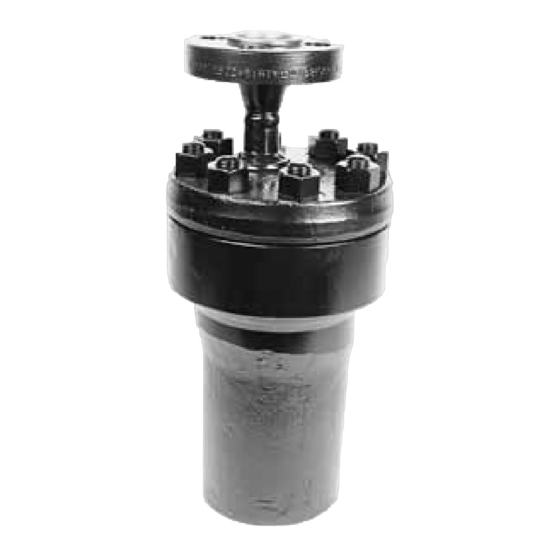Armstrong FLO-RITE-TEMP 415 Installations- und Einstellungsanweisungen - Seite 6
Blättern Sie online oder laden Sie pdf Installations- und Einstellungsanweisungen für Warmwasserbereiter Armstrong FLO-RITE-TEMP 415 herunter. Armstrong FLO-RITE-TEMP 415 20 Seiten. Inverted bucket steam traps
Auch für Armstrong FLO-RITE-TEMP 415: Installations- und Einstellungsanweisungen (17 seiten), Beschreibung des Produkts (4 seiten)

Option #4 (Available only when a pressure reducing
station is installed on the Flo-Rite-Temp). Using the
Model GP-2000W1P system, when piped as shown in the
Option 4 drawing, will provide a safe dependable shut
down of the main steam valve when the water pressure
fails or drops rapidly on the Flo-Rite-Temp. Unlike a
solenoid application, which shuts the steam down when
the water pressure drops below a pre-set point, the GP-
2000W1P offers another benefit that it allows the system
to keep producing hot water even when the water pressure
is below the set pressure. The GP-2000W1P Combination
valve essentially lets the steam pressure modulate below
the water pressure by 2 or 3 pounds, allowing a water
heater to supply hot water even when water pressure is
low.
Incoming cold water is piped into the hot water heater with
a sample line piped to the W-1 Pilot of GP-2000W1P. At
the same time the cold water is supplying the water heater,
its pressure it is also supplying the W-1 Pilot. When the
pressure of the incoming cold water decreases, the W-1
Pilot modulates down the supply of steam to the pressure
pilot controlling the main steam valve, acting as a non-
electric self-controlled shutdown device. Ultimately, this
valve eliminates the use of any electricity and gives the
customer safe control of their hot water supply when water
pressure loss or fluctuating water pressure conditions
exist.
Steam
Hot Water
Outlet
Option #4
ALWAYS be greater than steam pressure on the unit to
avoid boiling the water in the tubes of the heat exchanger.
When starting up a FLO-RITE-TEMP it is very
important that the water supply is turned on to the unit
before any steam is turned on. Once the unit is up and
running, the inlet water valve should never be closed
unless the steam is turned off first. When shutting down a
unit you should always first shut off the steam and then
allow water to run through the unit until it has cooled and
completely condensed all remaining steam in the heat
exchanger before closing off the supply water to the unit.
which need to be made on initial start-up. One setting must
be made at low flow while the other is made at high flows.
IMPORTANT: Once the low and high flow adjustments
have been made, the unit generally need not be adjusted
again unless your operating conditions change or a
different set point is desired. A significant drop in
temperature output or capacity is an indication of a bad
diaphragm or that the tube bundle needs to be cleaned. Do
not readjust the valve unless isolation of the unit from the
system and running water to drain produces poor
temperature control. If capacity is minimal, check the
diaphragm or clean the bundle but do not readjust the
control valve.
1.
Condensate
2.
Cold Water
Inlet
3.
6
IMPORTANT UNIT START-UP AND
SHUTDOWN PROCEDURES
Its important to remember that water pressure must
ADJUSTING PROCEDURES
All models of FLO-RITE-TEMP's have two settings
START-UP AND ADJUSTING
PROCEDURE FOR MODEL 415
Before turning on the steam to the FLO-RITE-TEMP,
begin by opening the water supply valve to the unit
and checking for water leaks at the unit or any of the
associated piping.
If the unit is connected to a system which has a
recirculation loop and pump, be sure the pump is
turned off and the isolation valve on the leg of piping
going from the diverting valve back to the inlet of
the FLO-RITE-TEMP is closed (this is the isolation
valve downstream of port "B" of the thermostatic
diverting valve). (See Fig. 3-1)
Close the isolation valve on the hot water outlet of
the unit and open full and close several times the
throttling bypass valve to drain to purge all the air
from the FLO-RITE-TEMP. (See Fig. 3-1B). This
process also primes the units lower diaphragm area
with water. Failure to do this prior to initial
adjustment can result in inaccurate settings and
poor results.
